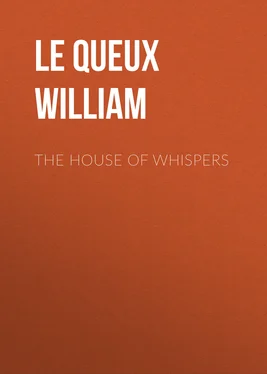William Le Queux - The House of Whispers
Здесь есть возможность читать онлайн «William Le Queux - The House of Whispers» — ознакомительный отрывок электронной книги совершенно бесплатно, а после прочтения отрывка купить полную версию. В некоторых случаях можно слушать аудио, скачать через торрент в формате fb2 и присутствует краткое содержание. Жанр: foreign_sf, foreign_antique, foreign_prose, на английском языке. Описание произведения, (предисловие) а так же отзывы посетителей доступны на портале библиотеки ЛибКат.
- Название:The House of Whispers
- Автор:
- Жанр:
- Год:неизвестен
- ISBN:нет данных
- Рейтинг книги:4 / 5. Голосов: 1
-
Избранное:Добавить в избранное
- Отзывы:
-
Ваша оценка:
- 80
- 1
- 2
- 3
- 4
- 5
The House of Whispers: краткое содержание, описание и аннотация
Предлагаем к чтению аннотацию, описание, краткое содержание или предисловие (зависит от того, что написал сам автор книги «The House of Whispers»). Если вы не нашли необходимую информацию о книге — напишите в комментариях, мы постараемся отыскать её.
The House of Whispers — читать онлайн ознакомительный отрывок
Ниже представлен текст книги, разбитый по страницам. Система сохранения места последней прочитанной страницы, позволяет с удобством читать онлайн бесплатно книгу «The House of Whispers», без необходимости каждый раз заново искать на чём Вы остановились. Поставьте закладку, и сможете в любой момент перейти на страницу, на которой закончили чтение.
Интервал:
Закладка:
"But though you're out, you never go anywhere. Surely that's unusual for one so active and—well"—he hesitated—"I wonder whether I might be permitted to say so—so good-looking as you are, Gabrielle."
"Ah!" replied the girl, protesting, but blushing at the same time, "you're poking fun at me, Mr. Flockart. All I can reply is, first, that I'm not good-looking; and, secondly, I'm not in the least dull—perhaps I should be if I hadn't my father's affairs to attend to."
"They seem to take up a lot of your time," he said with pretended indifference, but, to his annoyance, landed a salmon parr at the same moment.
"We work together most evenings," was her reply.
The question which he then put as he threw the parr back into the burn struck her as curious. It was evident that he was endeavouring to learn from her the nature of her father's correspondence. But she was shrewd enough to parry all his ingenious cross-questioning. Her father's secrets were her own.
"Some ill-natured people gossip about Sir Henry," he remarked presently, as he made another long cast up-stream and allowed the flies to be carried down to within a few yards from where he stood. "They say that his source of income is mysterious, and that it is not altogether open and above-board."
"What!" she exclaimed, looking at him quickly. "And who, pray, Mr.
Flockart, makes this allegation against my father?"
"Oh, I really don't know who started the gossip. The source of such tales is always difficult to discover. Some enemy, no doubt. Every man in this world of ours has enemies."
"What do you mean by the source of dad's income not being an honourable one?"
The man shrugged his shoulders. "I really don't know," he declared. "I only repeat what I've heard once or twice up in London."
"Tell me exactly what they say," demanded the girl, with quick interest.
Her companion hesitated for a few seconds. "Well, whatever has been said, I've always denied; for, as you know, I am a friend of both Lady Heyburn and of your father."
The girl's nostrils dilated slightly. Friend! Why, was not this man her father's false friend? Was he not behind every sinister action of Lady Heyburn's, and had not she herself, with her own ears, one day at Park Street, four years ago, overheard her ladyship express a dastardly desire in the words, "Oh, Henry is such a dreadful old bore, and so utterly useless, that it's a shame a woman like myself should be tied up to him. Fortunately for me, he already has one foot in the grave. Otherwise I couldn't tolerate this life at all!" Those cruel words of her stepmother's, spoken to this man who was at that moment her companion, recurred to her. She recollected, too, Flockart's reply.
This hollow pretence of friendship angered her. She knew that the man was her father's enemy, and that he had united with the clever, scheming woman in some ingenious conspiracy against the poor, helpless man.
Therefore she turned, and, facing him boldly, said, "I wish, Mr. Flockart, that you would please understand that I have no intention to discuss my father or his affairs. The latter concern himself alone. He does not even speak of them to his wife; therefore why should strangers evince any interest in them?"
"Because there are rumours—rumours of a mystery; and mysteries are always interesting and attractive," was his answer.
"True," she said meaningly. "Just as rumours concerning certain of my father's guests possess an unusual interest for him, Mr. Flockart. Though my father may be blind, his hearing is still excellent. And he is aware of much more than you think."
The man glanced at her for an instant, and his face darkened. The girl's ominous words filled him with vague apprehension. Was it possible that the blind man had any suspicion of what was intended? He held his breath, and made another vicious cast far up the rippling stream.
CHAPTER IX
REVEALS A MYSTERIOUS BUSINESS
In the few days which followed, Lady Heyburn's attitude towards Gabrielle became one of marked affection. She even kissed her in the breakfast-room each morning, called her "dear," and consulted her upon the day's arrangements.
Poor Sir Henry was but a cipher in the household. He usually took all his meals alone, except dinner, and was very seldom seen, save perhaps when he would come out for an hour or so to walk in the park, led by his daughter, or else, alone, tapping before him with his stout stick. On such occasions he would wear a pair of big blue spectacles to hide the unsightliness of his gray, filmy eyes. Sometimes he would sit on one of the garden seats on the south side of the house, enjoying the sunshine, and listening to the songs of the birds, the hum of the insects, and the soft ripples of the burn far below. And on such occasions one of his wife's guests would join him to chat and cheer him, for everyone felt pity for the lonely man living his life of darkness.
No one was more full of words of sympathy than James Flockart. Gabrielle longed to warn her father of that man, but dared not do so. There was a reason—a strong reason—for her silence. Sir Henry had declared that he was interested in the man's intellectual conversation, and that he rather liked him, though he had never looked upon his face. In some things the old gentleman was ever ready to adopt his daughter's advice and rely upon her judgment; but in others he was quite obstinate and treated her pointed remarks with calm indifference.
One day, at Lady Heyburn's suggestion, Gabrielle, accompanied by Flockart and another of the guests, a retired colonel, had driven over in the big car to Perth to make a call; and on their return she spent some hours in the library with her father, attending to his correspondence.
That morning a big packet of those typed reports in French had arrived in the usual registered, orange-coloured envelope, and after she had read them over to the Baronet, he had given her the key, and she had got out the code-book. Then, at his instructions, she had written upon a yellow telegraph-form a cipher message addressed to the mysterious "Meteforos, Paris." It read, when decoded:—
"Arrange with amethyst. I agree the price of pearls. Have no fear of Smithson, but watch Peters. If London refuses, then Mayfair. Expect report of Bedford."
It was not signed by the Baronet's name, but by the signature he always used on such telegraphic replies: "Senrab."
From such a despatch she could gather nothing. At his request she took away the little blue-covered book and relocked it in the safe. Then she rang for Hill, and told him to send the despatch by messenger down to Auchterarder village.
"Very well, miss," replied the man, bowing.
"The car is going down to take Mr. Seymour to the station in about a quarter of an hour, so Stokes will take it."
"And look here," exclaimed the blind man, who was standing before the window with his back to the crimson sunset, "you can tell her ladyship, Hill, that I'm very busy, and I shan't come in to dinner to-night. Just serve a snack here for me, will you?"
"Very well, Sir Henry," responded the smart footman; and, bowing again, he closed the door.
"May I dine with you, dad?" asked the girl. "There are two or three people invited to-night, and they don't interest me in the least."
"My dear child, what do you mean? Why, aren't Walter Murie and his mother dining here to-night? I know your mother invited them ten days ago."
"Oh, why, yes," replied the girl rather lamely; "I did not recollect.
Then, I suppose, I must put in an appearance," she sighed.
"Suppose!" he echoed. "What would Walter think if you elected to dine with me instead of meeting him at table?"
"Now, dad, it is really unkind of you!" she said reprovingly. "Walter and I thoroughly understand each other. He's not surprised at anything I do."
Читать дальшеИнтервал:
Закладка:
Похожие книги на «The House of Whispers»
Представляем Вашему вниманию похожие книги на «The House of Whispers» списком для выбора. Мы отобрали схожую по названию и смыслу литературу в надежде предоставить читателям больше вариантов отыскать новые, интересные, ещё непрочитанные произведения.
Обсуждение, отзывы о книге «The House of Whispers» и просто собственные мнения читателей. Оставьте ваши комментарии, напишите, что Вы думаете о произведении, его смысле или главных героях. Укажите что конкретно понравилось, а что нет, и почему Вы так считаете.












